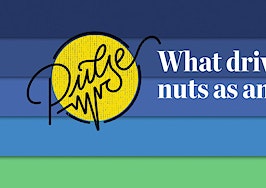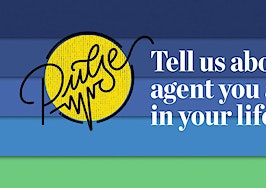Pulse is a recurring column where we ask for readers’ takes on varying topics in a weekly survey and report back with our findings.
Even in 2022, buyer love letters are still kind of murky waters. They’re legal in 49 states but could land Realtors in ethics trouble. (Ethics expert Barbara Betts lays out exactly how buyer love letters can land you in ethics trouble here.)
Many argue that they violate the Fair Housing Act by paving the way for discrimination by including details pertaining to race, gender, sexuality, familial status, etc.
Last week, we asked readers, “Are you still sending some form of buyer love letter? If not, what are you doing instead? How are you filling the void to give your buyers a competitive edge? What are other agents doing?”
We received a wealth of responses that range from never again to still sending, with some gray areas and options mixed in. Here’s what they had to say:
Don’t send ’em
- We stay away from buyer love letters as if they were radioactive. They might as well be. You could get severely burned by being associated with one. When buyers ask us to forward a buyer love letter, we respond with a hard no. It has happened that buyers have approached sellers directly one way or another. Most of our seller clients put into this situation are irritated by it.
- I have discontinued all buyer love letters. I explain why and my buyers usually understand and agree.
- They are a complete waste of everybody’s time, that is old-school technology or thought process. In this market, sellers simply want the best terms, conditions and price for their house.
- As a listing agent, I don’t. It’s not part of the contract; seller does not even see it. However, I may provide seller with some pertinent information if it contains additional seller benefits. As a buyer agent, I write an email with the offer providing insight and buyer notes about the offer, but there is no “love” content — just qualitative information that may benefit the seller and the buyer that otherwise cannot be included in the contract.
- I don’t use them. The one thing I try to do is let the seller know the buyer plans to live in the home and not flip it. That’s important to some sellers.
- We’ve stopped … don’t ask buyers to write them, ask buyer’s agents not to submit them.
- No longer sending. Just highlighting the merits of the offer.
- Discourage buyers from using them, encouraging them to make a strong offer.
- I’m not! They’re a bad idea for agents to facilitate, particularly when the letter states which protected class the buyer is in (e.g., I want to raise my children, my wife/husband and I, etc.)
- Not sending any letters.
- My clients do not submit letters nor do my sellers accept them.
- Encouraging sellers to not allow them and encouraging buyers to not submit them.
- Not using them.
- I explain to purchasers why they are not advisable; most of my clients have no interest in doing them.
Send ’em
- I ask the other agent if they will accept the love letter. So far so good.
- I ask the seller if they want to hear or see them?
- I am a Hispanic American and I still send buyer love letters. I have a much better response when I send them even when I represent buyers of another nationality. I get that some people are racist, however, I don’t believe we should change the law to fit the few.
Sort of/sometimes
- I will only share them with no pictures and if no violations of discrimination are in the letter.
- Very carefully and very infrequently. No photos. No info about the buyer’s family status or anything that might be a protected class. If they insist on writing a love letter, I ask them to stick to complimenting the seller on design choices. That being said, I did have a buyer win in a multiple offer situation last year without the highest offer because her letter was about how she wanted to buy a house so she could rescue dogs. It turned out that the seller was into dog rescue, and that won her over.
- Some sellers want to see them in our northern New Jersey area. I try to encourage my buyers that insist on writing a letter to keep letters house- or neighborhood-focused and less about who they [are].
- I send them. I make sure they don’t include any Fair Housing violations or anything that could be construed as information that would lead to a fair housing violation. If you are not at least trying to present your clients’ emotional connection to a house, you are not representing your client to the best of your ability. With all the video cameras in homes these days, sellers know exactly who has looked at their house — and everything about them. Sellers Google the names on the offer and research the buyers like they have a side-hustle at the CIA. You are a fool if you think that “prohibiting love letters” is somehow leveling the playing field. In fact, there is a good argument to be made that a seller may very well more favorably consider an FHA, VA or some “weaker terms” if they know the buyers are going to love their home as much as they have — if given the opportunity.
- I don’t send them unless my client asks to and in a multiple-offer situation, I remove love letters from offers. My clients can have all the love letters after the closing is complete.
- I just focus on how much they love the home and the things they love about the home.
Other options
- Request to be present, offer in person.
- Escalation clauses. We have our buyers state in their offers that they will beat the highest offer by a substantial amount. This can be as little as $25,000 and as much as $500,000, depending upon the price point. Astonishingly, few other agents are aware of this tactic. In my market, I am not going to alert them.
- A letter/ email of introduction highlighting the price terms, characteristics and motivation rather than familial status or details.
- A cover letter that talks about how successful the lender is at closing. Why I am a good agent to work with and how we will work hard to make it a smooth transaction. Avoiding anything that can violate fair housing and tip scales is key.
- I stopped sending love letters but use the email to the listing agent (with the offer documents attached) to talk about my buyers and why this is the perfect home for them. I am a veteran and many of my clients are veterans, so I emphasize that. I also compliment the sellers and the listing agent on how well they prepared the property for listing. I also explain that I set the proper expectations for my buyers in this market and they will be reasonable throughout the transaction if their offer is accepted. If I see something in the property that connects the buyers with the sellers, I highlight that as well.
What did we miss? Please share your thoughts in the comments section below.








